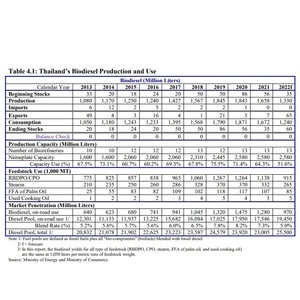Thailand's biodiesel production, use declines in 2022

August 15, 2022
BY Erin Krueger
Thailand’s production of biodiesel is expected to decline for the third consecutive year in 2022, according to a report filed with the USDA Foreign Agricultural Service’s Global Agricultural Information Network. Biodiesel consumption is also expected to fall.
According to the report, Thailand is expected to produce 1.33 billion liters (351.35 million gallons) of biodiesel in 2022, down from 1.658 billion liters in 2021, 1.843 billion liters in 2020 and 1.845 billion liters in 2019.
Advertisement
The country currently has 13 biodiesel plants, a number that has held steady since 2020. Nameplate capacity is expected to be at 2.58 billion liters in 2022, flat with both 2020 and 2021. Capacity use is forecast at 51.6 percent for 2022, down from 64.3 percent last year, 71.4 percent in 2020 and 75.5 percent in 2019.
Thailand’s biodiesel producers are expected to take in 1.265 million metric tons of palm oil-derived feedstocks this year, along with 5,000 metric tons of used cooking oil.
Thailand is not expected to import any biodiesel this year. Biodiesel exports are expected to reach 65 million liters, up from 7 million liters in 2021 and 3 million liters in 2020.
Advertisement
Biodiesel consumption is expected to fall to 1.24 billion liters, down from 1.672 billion liters in 2020 and 1.871 billion liters in 2020. Biodiesel used in on-road applications is expected to fall to 970 million liters in 2022, down from 1.28 billion liters in 2021 and 1.475 billion liters in 2020. Biodiesel is expected to account for 5 percent of Thailand’s on-road diesel use this year, down from 7.3 percent last year and 8.2 percent in 2020. The country is expected to consume 14.543 billion liters of B7 this year, along with 7.028 billion liters of D10 and 360 million liters of B20.
A full copy of the report can be downloaded from the USDA FAS GAIN website.
Related Stories
The U.S. EPA on July 8 hosted virtual public hearing to gather input on the agency’s recently released proposed rule to set 2026 and 2027 RFS RVOs. Members of the biofuel industry were among those to offer testimony during the event.
The USDA’s Risk Management Agency is implementing multiple changes to the Camelina pilot insurance program for the 2026 and succeeding crop years. The changes will expand coverage options and provide greater flexibility for producers.
The USDA’s National Agricultural Statistics Service on June 30 released its annual Acreage report, estimating that 83.4 million acres of soybeans have been planted in the U.S. this year, down 4% when compared to 2024.
SAF Magazine and the Commercial Aviation Alternative Fuels Initiative announced the preliminary agenda for the North American SAF Conference and Expo, being held Sept. 22-24 at the Minneapolis Convention Center in Minneapolis, Minnesota.
Global digital shipbuilder Incat Crowther announced on June 11 the company has been commissioned by Los Angeles operator Catalina Express to design a new low-emission, renewable diesel-powered passenger ferry.
Upcoming Events










